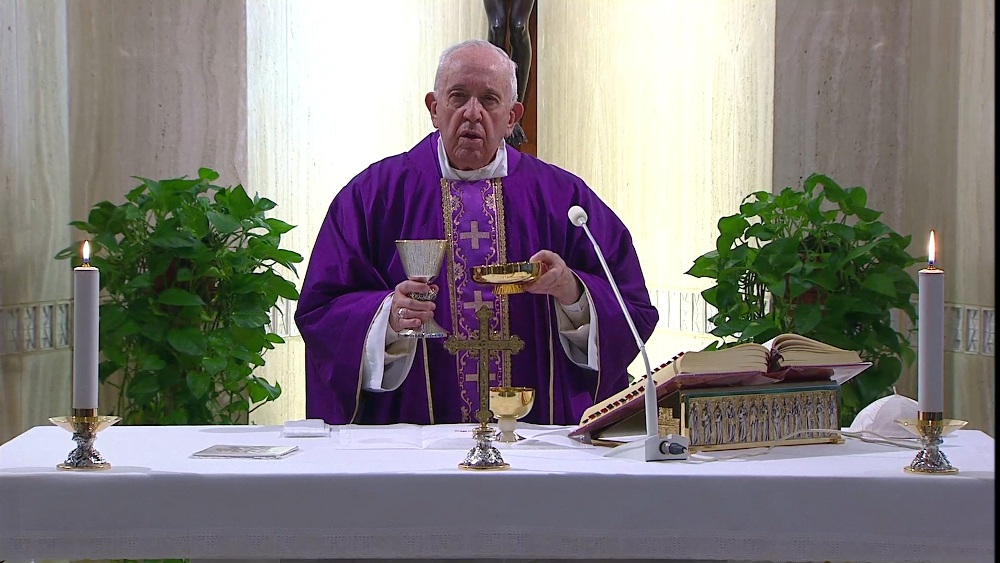
Pope Francis begins Mass March 9, 2020, saying he was celebrating the liturgy for all affected by the coronavirus epidemic and for the medical personnel assisting the sick. To avoid the risk of spreading the virus, the pope stopped inviting a small group of faithful to the morning Mass in the chapel of his residence, the Domus Sanctae Marthae, and instead asked the Vatican to livestream the Mass. (CNS screenshot from Vatican Media video)
During a live broadcast of his daily morning Mass, Pope Francis prayed for victims of the coronavirus epidemic and the many health care workers fighting its spread.
The pope said he offered the Mass for those infected by the virus, also known as COVID-19, as well as "the doctors, the nurses, the volunteers who help so much, family members, the elderly in retirement homes and prisoners who are incarcerated."
"This week let us pray together this powerful prayer to the Lord: 'Save me, O Lord, and show me mercy. My foot is on the righteous path. In the assembly, I will bless the Lord,'" he prayed March 9 at the start of the Mass at the Domus Sanctae Marthae.
The pope's daily morning Mass is usually celebrated privately with employees or about 20 invited guests.
However, due to a measure adopted to prevent the spread of the coronavirus, the pope stopped inviting outsiders to the Mass and asked that it be broadcasted live "so that those who want can unite in prayer with the bishop of Rome," the Vatican press office said.
The Italian government issued several nationwide measures to prevent the spread of the virus, including the suspension of "civil and religious ceremonies" as well as funerals, until April 3.
As of March 8, the virus has claimed the lives of 366 people in Italy, while 6,387 remained infected, the Italian health ministry said.
In his homily, the pope reflected on the first reading from the Book of Daniel in which the prophet begs God's forgiveness on behalf of the people of Israel.
Like Daniel, the pope said, Christians also make an examination of conscience and acknowledge their sins when preparing to receive the sacrament of reconciliation.
However, acknowledging one's sins doesn't mean "just making a list" of sins and waiting for God to forgive, the pope said.
"A true confession of sins must remain in the heart. Going to confession is not just telling the priest this list, 'I did this, this, this, this, this,' and then I'm gone, I'm forgiven," the pope said. "No, that's not it. It takes one step, one more step, which is the confession of our miseries, but from the heart; that is, that the list of bad things I have done goes down to the heart."
The feeling of shame that comes after acknowledging one's sins, he continued, is a grace that all Christians should ask for from God because a "person who has lost shame loses moral authority, loses respect for others."
Francis called on the faithful to pray for the "grace of shame" because the memory of one's sins and the feeling of shame "touches God's heart and he responds with mercy."
"The way to encounter God's mercy is to be ashamed of the bad things we have done," he said. "So, when I go to confession, I will not only say the list of sins but also the feelings of confusion, of shame for having done this to a God who is so good, so merciful and so just."
Advertisement







